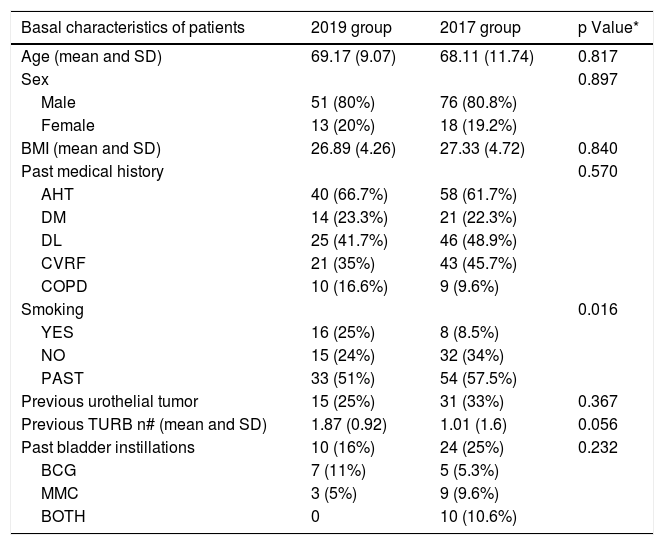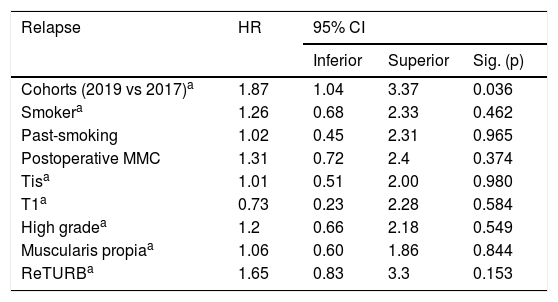During 2019 there was a worldwide shortage of BCG strains for intravesical instillation, limiting the availability of full dose schemes for maintenance courses. The main objective was to analyze the impact on tumoral relapse secondary to BCG shortage in our center. Secondary outcomes included recurrence and progression–free survival rates and tumoral relapse specific characteristics.
MethodsRetrospective cohort study including 158 subjects (64 treated during 2019 and 94 during 2017) with high-risk non-muscle invasive bladder cancer and treated with a combination of Transurethral bladder resection (TURB) followed by adjuvant intravesical instillation with BCG in a tertiary hospital in Spain.
Basal characteristics of both groups were analyzed. Times to event of interest (relapse; including recurrence and/or progression) were estimated with Kaplan–Meier survival analysis. Disease-free survival rates were analyzed using a multivariable Cox regression model of proportional hazards.
ResultsMedian follow-up in the 2019 sample was 24 months and 50 months in the 2017 group with a median number of instillations of 8 and 12 respectively. Median time to relapse of 285 days (145–448) during 2019 and 382 days (215–567) in 2017 were observed (logRank p = 0.025). Further multivariable analysis revealed a proportional hazard ratio (HR) for disease-free survival rate of 1.87 (95% CI: 1.04–3.37 p = 0.036). No statistically significant differences in tumoral relapse characteristics were observed.
ConclusionBCG shortage and subsequent reduced-dose schemes used for intravesical instillation due to limited availability, increase early tumoral relapse rates. These findings are consistent with available evidence, showing the need for full-dose BCG courses.
Durante 2019 se produjo una escasez mundial de cepas de BCG para instilación intravesical, limitando la disponibilidad de esquemas de dosis completas para la fase de mantenimiento. El objetivo principal del estudio fue analizar el impacto del desabastecimiento de BCG sobre la recidiva tumoral en nuestro centro. Los criterios de valoración secundarios incluyeron las tasas de recidiva y supervivencia libre de progresión y las características específicas de la recidiva tumoral.
MétodosEstudio de cohortes retrospectivo que incluye a 158 sujetos (64 tratados durante 2019 y 94 durante 2017) con cáncer vesical no infiltrante de alto riesgo y tratados con una combinación de resección transuretral de vejiga (RTUV) seguida de instilación intravesical de BCG adyuvante en un hospital terciario de España.
Se analizaron las características basales de ambos grupos. El periodo transcurrido hasta el evento de interés (recaída; incluyendo recurrencia o progresión) se estimó con el análisis de supervivencia de Kaplan-Meier. Las tasas de supervivencia libre de enfermedad se analizaron mediante un modelo multivariable de regresión de Cox de riesgos proporcionales.
ResultadosLa mediana del tiempo de seguimiento fue de 24 y 50 meses en las muestras de 2019 y 2017, respectivamente, con una mediana del número de instilaciones de 8 y 12, respectivamente. Se observó una mediana de tiempo hasta la recurrencia de 285 días (145–448) durante 2019 y de 382 días (215–567) en 2017 (log-rank p = 0,025). Un análisis multivariable adicional reveló un HR proporcional para la tasa de supervivencia libre de enfermedad de 1,87 (IC 95%: 1,04–3,37 p = 0,036). No se observaron diferencias estadísticamente significativas en las características de la recaída tumoral.
ConclusiónEl desabastecimiento de BCG y los posteriores esquemas de dosis reducidas debido a este aumentan las tasas de recaída tumoral precoz. Estos resultados coinciden con la evidencia disponible, demostrando la necesidad de dosis completas de BCG.









